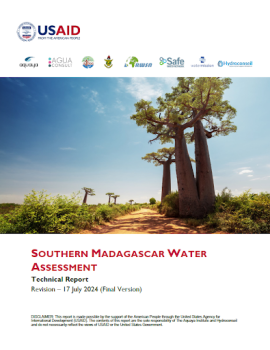Enjoy streamlined UX at leading cash app casinos.
The Southern Madagascar Water Assessment Buy-In aims to develop actionable recommendations for USAID’s water security programming across the Grand Sud of Madagascar. This technical report, developed by USAID REAL-Water, is the third project output, presenting findings and preliminary programming recommendations.
Among other water-related programs across the Grand Sud, the World Bank is investing the order of US $16 million through 20261 in village-level water supply infrastructure rehabilitation across the area of interest (AOI) in the Grand Sud, focused on upgrading and rehabilitating existing manual pump-equipped boreholes, as well as conversion to solar power. The transition aims to enhance water supply reliability and efficiency across the region, but the rapid pace of implementation poses risks and challenges. The government’s institutional capacity to regulate this transition is questionable, as is the capacity of service providers (which sometimes include the communities themselves) to professionally manage rehabilitated systems.
We highlight the following:
- Widespread water infrastructure upgrades: By 2026, at least 776 World Bank-financed boreholes will be upgraded from manual to solar-powered systems. This will increase the complexity of the water supply systems (increasing maintenance and repair requirements) and is anticipated to be accompanied by a shift from existing informal and community water management to formal private operator management.
- Chronic lack of local institutional capacity: Commune-level and Regional Directorate of Water, Sanitation, and Hygiene (DREAH) institutions are under-resourced and lack the capacity to support, oversee, and regulate service providers effectively. Such a lack of capacity increases the likelihood that recently rehabilitated systems will underperform and/or fail.
- Financial Sustainability: Our own financial analysis suggests that the water tariffs recommended by MEAH (100 MGA / 20L) will make significant cost recovery impossible in rural settings. We estimate that solar-powered systems will face financial shortfalls of roughly $2,500 per year each, on average.
- Poor private operator service delivery: Existing service providers struggle financially to operate across the Grand Sud due to low revenues and high costs of working in remote areas.
- A lack of community engagement: Communities that have benefited from upgraded infrastructure express frustration with the lack of communication regarding water pricing policies and other essential information related to the introduction of new management systems.

